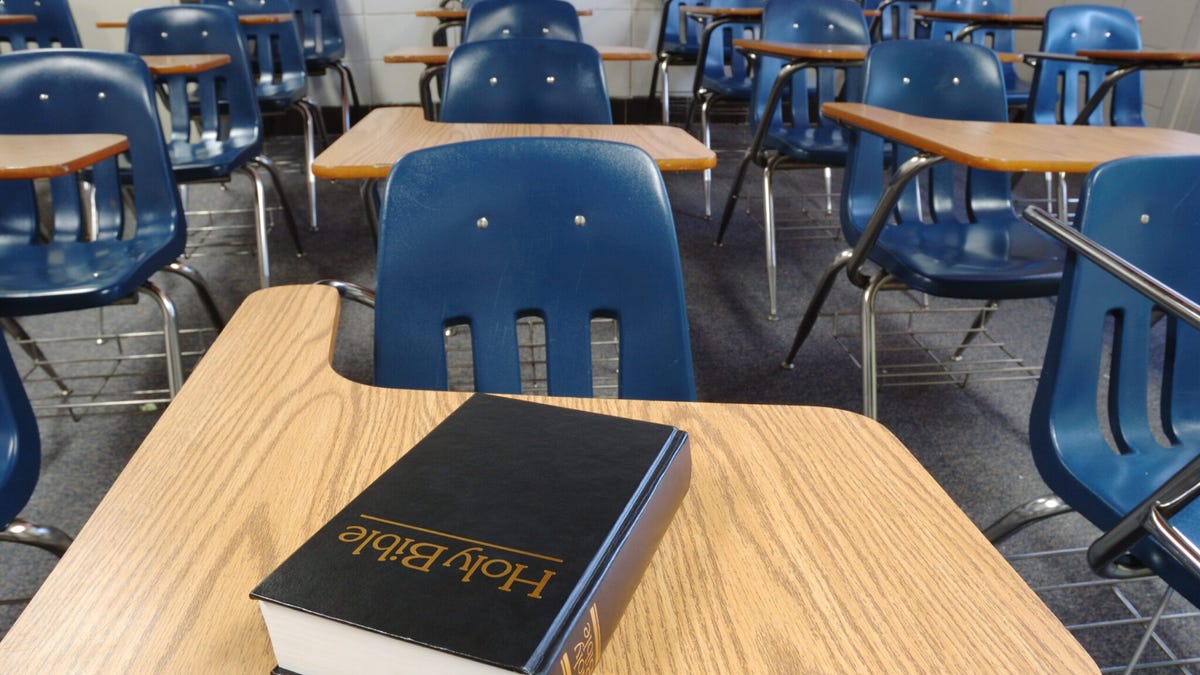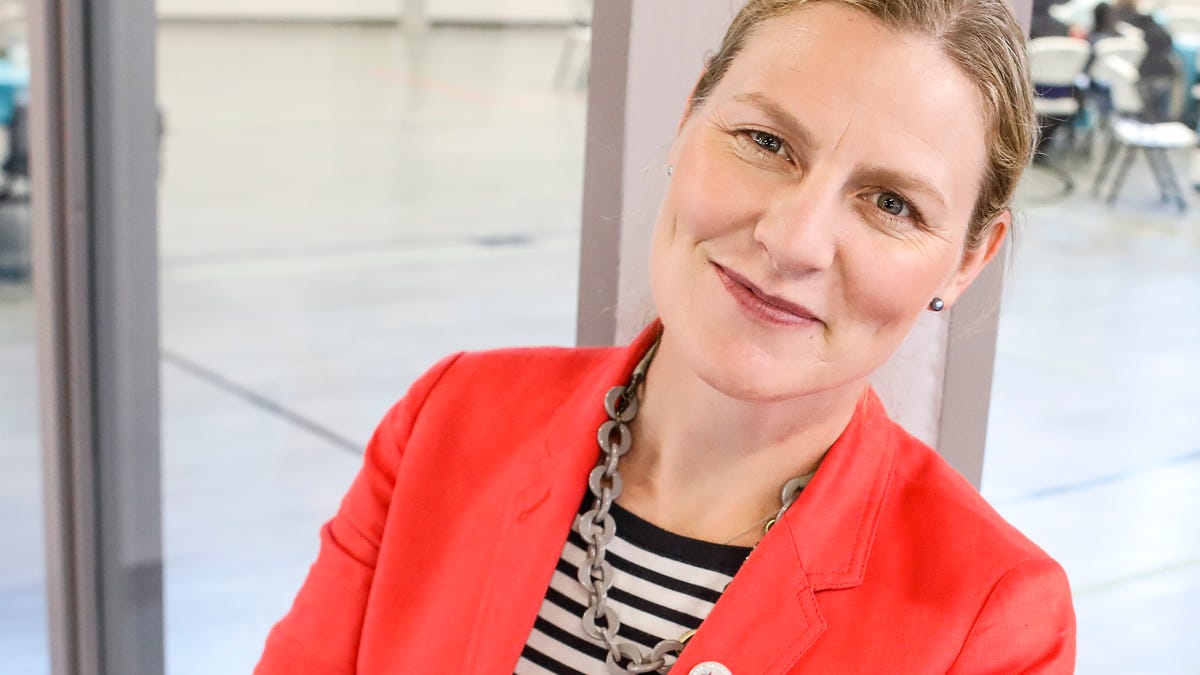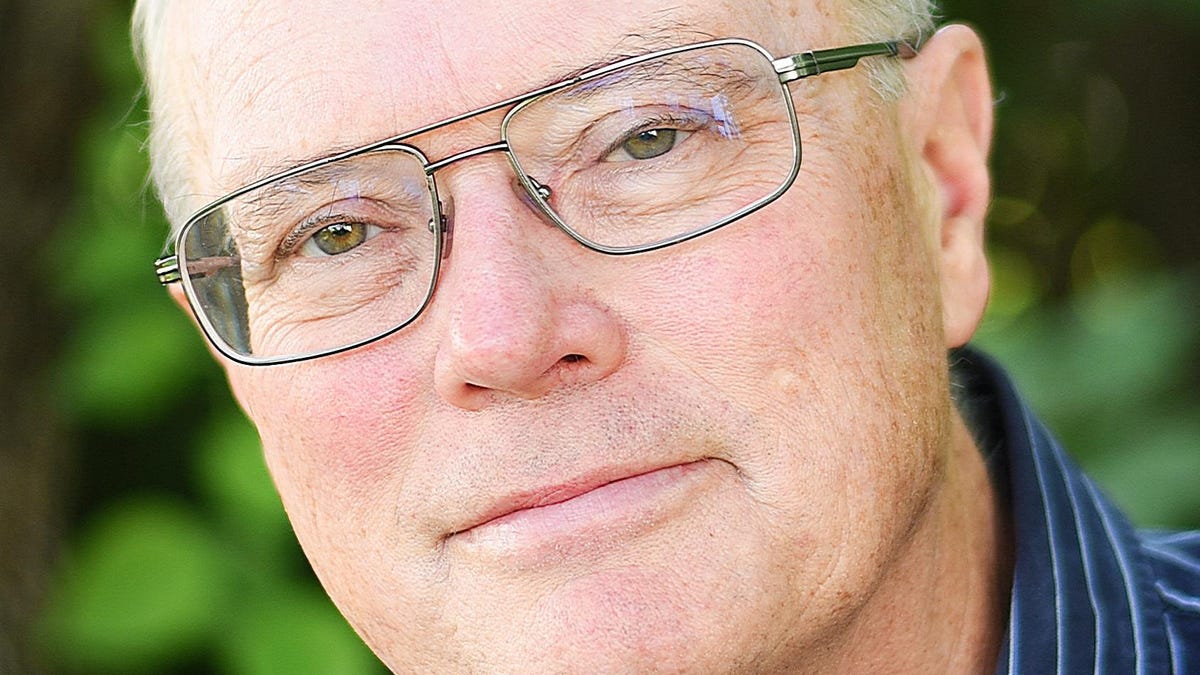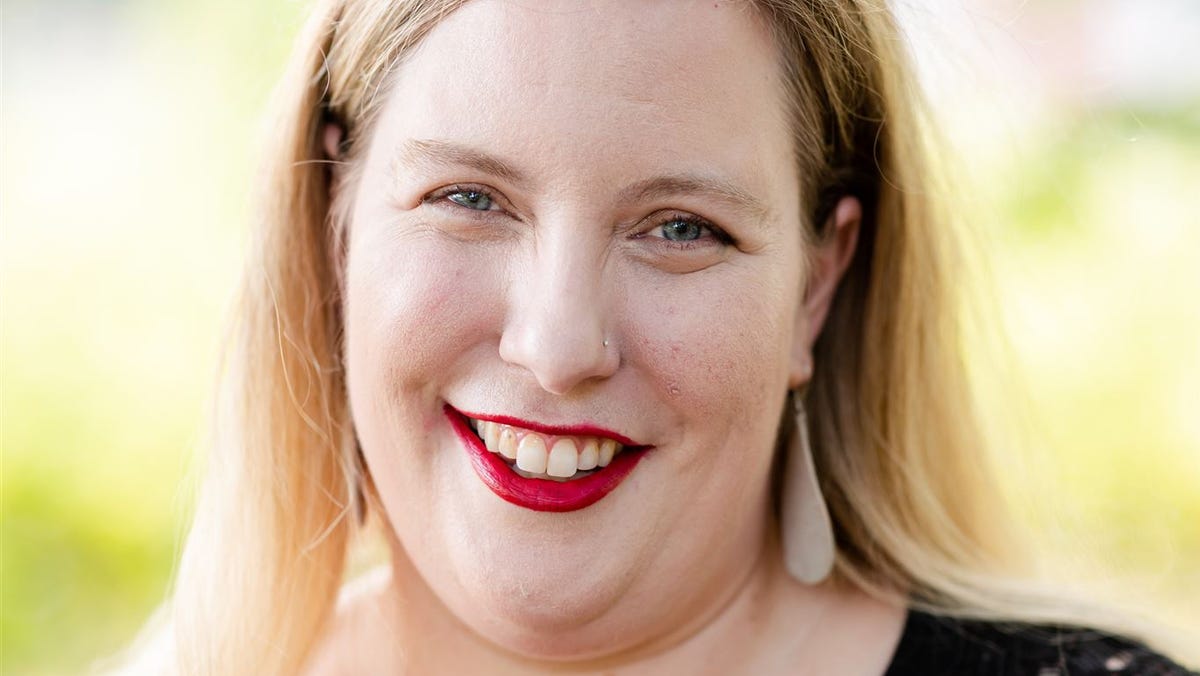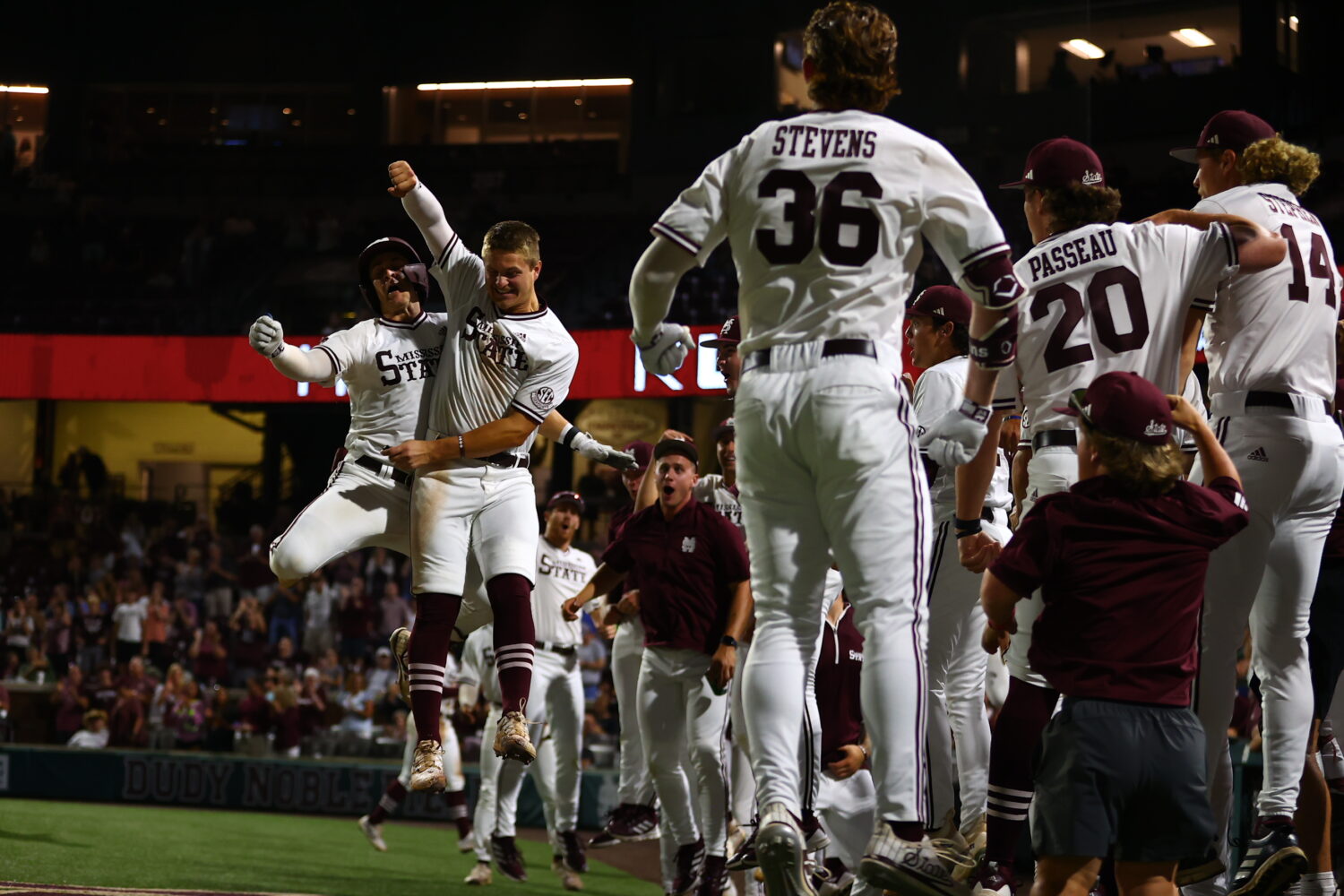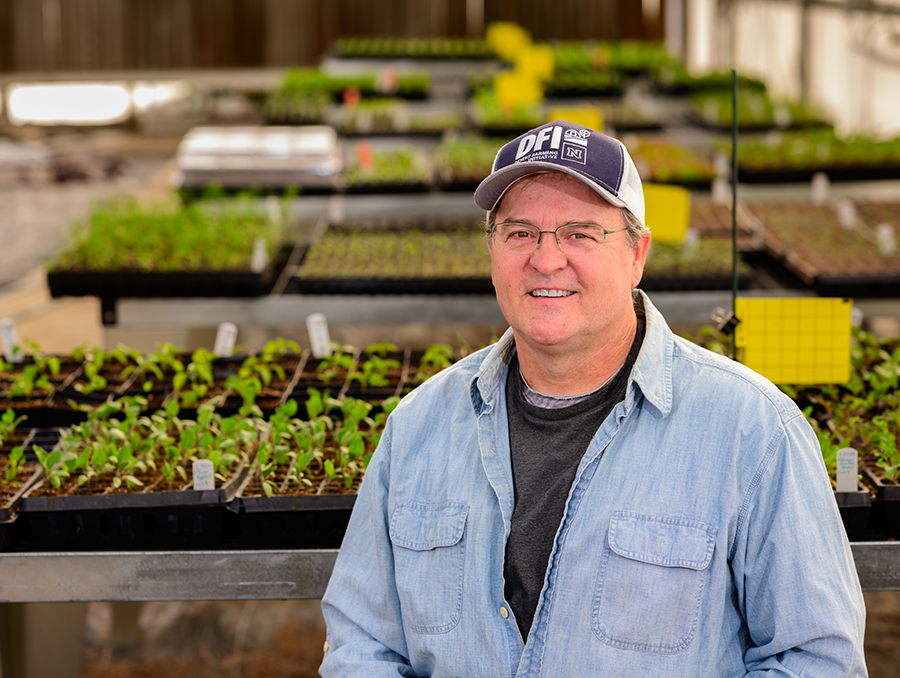Louisiana
Guest column: Research and regulation of carbon capture risk is robust

The Mississippi River has made south Louisiana a global center of industry and commerce. Taken collectively, the system of ports on the river is one of the largest in the world. Industrial facilities along the river provide fuels to power everything from lawnmowers to aircraft carriers. They produce fertilizers that allow the world’s population to be fed, and chemical feedstocks that allow for the production of everything from building materials to medicine.
This concentration of productivity also means that Louisiana, unlike most other states, gets a majority of its carbon dioxide emissions from the industrial rather than the transportation sector. It is the very concentration of these sources of CO2 emissions that makes south Louisiana an ideal place for large scale carbon capture and storage operations.
The idea of injecting the emissions and byproducts of industrial production underground is nothing new for Louisiana. It was decided decades ago that it was significantly safer and more effective to inject industrial wastewater into underground saline aquifers rather than handle them at the surface.
The wastewater from a typical fertilizer plant may include chemicals such as arsenic, lead and mercury. The Louisiana Department of Natural Resources currently regulates 3,459 injection wells including those that inject CO2 for enhanced oil recovery. DNR has a robust regulatory process that effectively evaluates the potential risks of the injection operations.
There are some differences between industrial wastewater injection and the injection of CO2, and this is why academic research on CCS operations is so important. The LSU Center for Energy Studies and the Bureau of Economic Geology at UT Austin are at the forefront of CCS research for Louisiana. They have produced several significant studies and reports that provide overviews of the entire enterprise and detailed evaluations of all of the important geological parameters of CO2 injection and storage.
These evaluations include the storage capacity of saline aquifers, the integrity of the overlying confining zones and the potential for transmissivity by faults. They provide a database of critical parameters for CCS operators and regulators so that appropriate safety margins can be built into the design of CCS projects. Studies by CES and BEG provide a comprehensive picture of the subsurface geology essential to CO2 storage.
It is interesting that capacity for storage of CO2 underground in south Louisiana is also closely tied to the Mississippi River. The ancestral Mississippi has been draining the North American continent for more than fifty million years. Deposits in the river deltas and on the continental shelf have accumulated throughout this time span, and sedimentary layers extend down miles below the surface. They provide both permeable layers of sand and the impermeable layers of shale (lithified clay) necessary for underground storage.
BEG studies have shown that the saline aquifers formed by these sand layers have excellent capacity to store CO2, and the broadly extensive shale layers make excellent seals that keep it in the aquifers.
Opponents to CCS operations in Louisiana often speak about associated geological risks. Assertions have been made of the potential for the risk of leakage up abandoned oil and gas wells, vertical transmissivity by faults, and the potential for induced seismicity (earthquakes). Aside from the observation that all of these theoretical risks apply equally to wastewater injection wells — and there should have been some evidence of their occurrence over the last 50 years — these assertions are generally made with the implication that the risks are not being evaluated and quantified. This undermines the integrity of researchers at CES and BEG and regulators at EPA and DNR.
Existing and ongoing research is providing a solid foundation of understanding for all aspects of CCS operations. The regulatory process for CCS is as robust as any other enterprise in this country. Scientists and engineers at EPA and DNR work diligently to ensure that all potential risks are properly evaluated and addressed, and the safety of all Louisiana residents and their drinking water will be protected. To suggest otherwise is irresponsible at best.
The Mississippi River has brought together the rich geological history and the modern economic prowess of south Louisiana in such a way that a concentration of CO2 emissions is underlain by a massive array of saline aquifers that are capable of storing those emissions. This coincidence offers the state the potential to become a global leader reducing carbon emissions.
It is an opportunity that we should not squander.
Chris McLindon is manager of McLindon Geosciences, LLC. He has worked for 40 years as a geologist in the energy industry.

Louisiana
Louisiana VooDoo is no longer an Arena Football League Team

LAKE CHARLES, La. (KPLC) – Per a press release from the Arena Football League on Tuesday evening, the Louisiana VooDoo will not be retained as one of the 10 teams the league will move forward with.
The VooDoo were introduced in November and were supposed to play their home games at the Lake Charles Event Center, but on April 19, just eight days before their first game was set to be played, it was announced that they would be moving to Blackham Coliseum in Lafayette.
The team alleged that the move was due to problems with the company that manages the Lake Charles Event Center, ASM, which ASM rebutted, saying the team never provided the necessary insurance documents, nor had payment been received for the lease.
Following the Voodoo’s first game on April 27, in which they beat the Philadelphia Soul 53-18, their next two games were postponed, and canceled due to problems with the netting at Blackham Coliseum.
Included in the press release was the announcement that former NFL head coach Jeff Fisher will serve as the league’s new interim commissioner. Fisher is the current President of Football Operations for the Nashville Kats, one of the 10 teams retained by the league per the press release.
The press release did state that they will “be speaking to the other teams not mentioned, to discuss, and perhaps include them in current games in current games/seasons.”
Officials with the VooDoo said the team is still trying to work something out with the Arena Football League to be included in plans for the future of the league.
Copyright 2024 KPLC. All rights reserved.
Louisiana
Louisiana House committee advances bill to ban consumable THC products

BATON ROUGE, La. (WVUE) – State lawmakers advanced a bill which would ban consumable THC products in the state.
THC (or Tetrahydrocannabinol) is a substance found in hemp which can provide a “high” when consumed.
In a 7 to 5 vote, the House Committee on Administration of Criminal Justice advanced SB237 sponsored by Sen. Thomas Pressly (R-Shreveport).
Pressly argued the bill will help keep children from consuming the hemp products containing THC. Consumable hemp products are currently legal in Louisiana for adults.
Congress made hemp federally legal through the 2018 Farm Bill.
Business owners testified the bill punishes law-abiding businesses, will push customers to the black market and cost Louisiana jobs.
It will need to pass the full House of Representatives before landing on the governor’s desk.
This is a developing story. Check back for updates and watch Fox 8 at 4 and 5.
See a spelling or grammar error in our story? Click Here to report it. Please include the headline.
Subscribe to the Fox 8 YouTube channel.
Copyright 2024 WVUE. All rights reserved.
Louisiana
Louisiana lawmakers insist child rape victims must carry their pregnancy to term
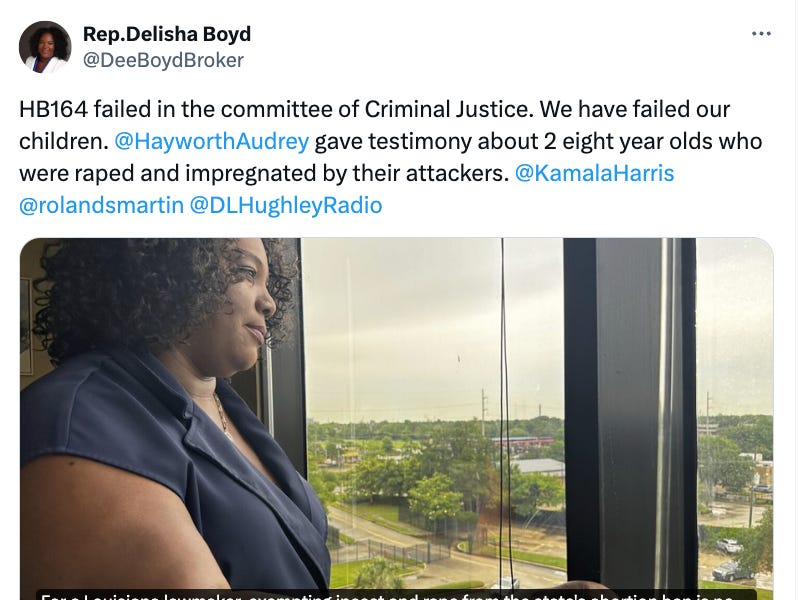
Former President Donald Trump, now the presumptive Republican nominee, boasts that he “broke Roe v. Wade.” In the aftermath, according to Trump, “states are working very brilliantly” to impose various restrictions on abortion and creating “very beautiful harmony.”
Over the last few days, this process has played out in Louisiana. Lawmakers in the Pelican State voted to continue to require child rape victims to carry their pregnancy to term.
After Roe v. Wade was overturned by the Supreme Court, Louisiana, along with 13 other states, imposed a ban on abortion at all stages of pregnancy. The only exceptions to Louisiana’s ban are when an abortion is necessary to save the life of the mother or in cases of “medically futile” pregnancy, when the fetus has a fatal abnormality. Doctors in the state “who perform illegal abortions can face up to 15 years in prison and steep fines of $10,000 to $200,000.”
In February, Louisana Representative Delisha Boyd (D) introduced legislation that proposed exceptions for rape and incest to Louisiana’s abortion ban. When it became clear that the proposal would fail, Boyd narrowed her bill to allow persons 16 years old and younger to have an abortion if they were the victim of rape or incest.
The legislation was grounded in Boyd’s personal experience. She was born after her mother was raped by a man when she was 15 years old. Boyd said that her mother suffered years of trauma before dying at 30.
Neelima Sukhavasi, an obstetrician from Baton Rouge, urged the members of the Louisiana House Committee on Criminal Justice to approve Boyd’s bill. Sukhavasi said that since Louisiana imposed its abortion ban in 2022, “[s]he and her colleagues have delivered babies for pregnant teenagers, including mothers as young as 13.” She told the committee, “[o]ne of these teenagers delivered a baby while clutching a Teddy Bear — and that’s an image that once you see that, you can’t unsee it.” According to Sukhavasi, these girls “can experience health complications that affect them for the rest of their lives.”
Nevertheless, the committee rejected Boyd’s bill last week on a 7 to 4 vote. All seven Republicans on the committee voted against creating the exception for child rape victims. One legislator who voted against creating the exception, Representative Lauren Ventrella (R), said she believed “teenagers who had consensual sex might feign rape or incest in order to get access to abortion service.” Another legislator in opposition, Representative Dodie Horton (R), said rape should be punished, but she “cannot condone killing the innocent.”
Louisiana politics has long been dominated by anti-abortion advocates. But, on this issue, the legislature is out of step with their constituents. A 2023 survey found that 77% of Louisiana voters supported an abortion exception for rape and incest. A survey this year by The Times-Picayune found a majority of Louisiana voters also support allowing abortion for any reason up to 15 weeks of pregnancy.
Anti-abortion lawmakers in Louisiana are also pushing a bill that would classify abortion medication as Schedule IV drugs, the same treatment as opioids. If the bill becomes law, Louisiana would be the first state in the country to classify mifepristone and misoprostol as controlled dangerous substances.
Under Senate Bill 276, anyone who possesses mifepristone or misoprostol – the two pills used in a medication abortion – without a valid prescription could face up to “five years in prison and $5,000 in fines.” The bill includes an exemption for pregnant women who use the drugs for their “own consumption.” But it still makes acquiring abortion drugs for future use – a practice known as advanced provision – effectively illegal.
The proposed law also “appears to target people who might obtain abortion medications in order to distribute them to pregnant people,” WWNO New Orleans Public Radio notes. In Louisiana, distributing or manufacturing controlled substances is a punishable offense “with up to 10 years in prison and $15,000 in fines.” According to the bill’s author, State Senator Thomas Pressly (R), the aim is to take the pills “away from people who are stockpiling these drugs for whatever reason.” The bill, which was written in collaboration with Louisiana Right to Life, also seeks to “create a new crime of ‘coerced criminal abortion by means of fraud,’” Pressly said in a press release. More than 240 Louisiana doctors said the proposed classification is “not scientifically based” and wrote that it could result in “unjustified mistrust by patients and fear of the medication.”
Critics also warn that the new penalties could discourage health providers from prescribing mifepristone and misoprostol and make pharmacies reluctant to fill out those prescriptions. Abortion medication is currently the most popular method of ending a pregnancy. The drugs targeted by Pressly’s bill also have uses outside of abortions: mifepristone is used to treat Cushing’s syndrome, a hormonal disorder, and given for miscarriage treatment. Meanwhile, misoprostol is prescribed to treat ulcers and is sometimes used to help patients give birth.
Louisiana’s limited exceptions for the life of the patient and “medically futile” pregnancies are both extremely narrow and poorly defined. But the state’s anti-abortion officials have promised to prosecute doctors for any perceived violations. A recent report by Physicians for Human Rights and other reproductive rights advocates concluded that Louisiana’s abortion ban violates “federal law meant to protect patient access to emergency care, disregard[s] evidence-based public health guidance, degrade[s] long-standing medical ethical standards, and, worst of all, den[ies] basic human rights to Louisianans seeking reproductive health care in their state.”
Specifically, “initial prenatal care in Louisiana is being pushed deeper into pregnancy, often beyond the first trimester when miscarriage is more common—purposely delayed to avoid the risk of miscarriage care being misconstrued as an abortion in violation of the bans.” As a result, pregnant women are “struggling to access time-sensitive, appropriate care for early pregnancy and miscarriages.”
Louisiana is already “among the U.S. states with the lowest number of employed obstetricians and gynecologists (OB-GYNs) in the country with the majority of its parishes having less than two per 100,000 residents.” This shortage is unlikely to dissipate as obstetricians and gynecologists in the state put themselves at risk of prosecution for providing basic prenatal care.
Louisiana’s House Committee on Criminal Justice also considered legislation last week to “insulate physicians and other health care providers from facing abortion-related charges if they were only trying to treat a pregnant person’s unavoidable miscarriage or troubled pregnancy.” At the hearing, Louisiana doctors testified that they were afraid of being thrown in jail for treating pregnant patients. The legislation was rejected by the committee.
-

 Politics1 week ago
Politics1 week agoHouse Dems seeking re-election seemingly reverse course, call on Biden to 'bring order to the southern border'
-

 Politics1 week ago
Politics1 week agoFetterman says anti-Israel campus protests ‘working against peace' in Middle East, not putting hostages first
-

 World1 week ago
World1 week agoGerman socialist candidate attacked before EU elections
-

 News1 week ago
News1 week agoUS man diagnosed with brain damage after allegedly being pushed into lake
-

 World1 week ago
World1 week agoGaza ceasefire talks at crucial stage as Hamas delegation leaves Cairo
-

 Politics1 week ago
Politics1 week agoRepublicans believe college campus chaos works in their favor
-

 World1 week ago
World1 week agoStand-in Jose Raul Mulino wins Panama presidential race
-

 World1 week ago
World1 week agoTech compliance reports, Newsletter

